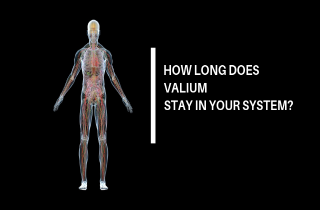Valium can stay in your system and be detected in urine for up to 5-7 days after therapeutic use. Chronic use (over one year) of Valium, however, can be detected much longer. The detection window for Valium in urine screens is up to 4-6 weeks. More here on the detection window and drug testing for Valium. We invite your questions about Valium drug screens at the end.
How do you take Valium?
Valium is generally taken as an oral table or injected under the skin. When taken orally, Valium rapidly is absorbed from the intestinal tract. On the other hand, the body tends to slowly and unpredictably absorb Valium when it is injected. Doctors usually prescribe Valium in dosages of 2-60 mg per day.
Valium half life: how long does Valium stay in your system
The half life of any drug, medication or substance is the period of time necessary for 1/2 the drug to be eliminated or disintegrated by natural processes in the body. The half life of Valium is particularly long, 20-80 hours. However, Valium’s typical half life in a young, healthy person is about 24 hours.This is due to the nature of the medication. Valium (diazepam) is a long acting benzodiazepine that starts inactive and becomes active as the normal metabolic process of the body occur and introduce the drug throughout the body (including the liver and the blood brain barrier).
Should I mix Valium with other drugs?
No. Valium SHOULD NOT be taken with other medications, drugs or alcohol. This is because Valium can interact with other substances to extend and increase the effects of Valium, causing it to stay in the bloodstream for even longer amounts of time. Likewise, the effects of Valium are decreased with the use of caffeine or cigarettes.
Drug Testing for Valium
If you are avoiding a drug test and think that you may have a problem with Valium…you probably do. If you’re worried about Valium detection during drug testing, it is best to wait 1-5 days before taking a drug test for Valium. Waiting for 5 days is a total precaution to make sure that the drug is totally out of your system. This is because Valium (diazepam) is a benzodiazepine and can be detected in the urine for days after you take it. For daily, chronic Valium use, diazapam can be detected in urine for 4-6 weeks even after you stop taking it.
Or, if you have a prescription for Valium, present this with a doctor’s note to the supervising Medical Officer. Even if Valium is in your system, you will test negative if you are taking Valium as prescribed.
Valium addiction
Can you get addicted to Valium? Yes. But what are the signs and indicators of Valium addiction?
Valium can be addictive, especially if taken for more than 4 months or for non medical reasons. But as a Class IV drug, there is a relatively low risk for addiction when compared to other drugs (like Vicodin, Codeine or Oxycodone). But if you take a larger dose of Valium than prescribed or more often that prescribed, you may develop tolerance to the drug. Long-term or excessive use can also result in withdrawal (a sign of physical dependence) when you stop taking the drug. But does this mean that you are addicted?
Let’s verify your coverage for treatment at an American Addiction Centers location. Your information is always confidential.
If you feel that you need help coping with your increasing need for lorazepam and would like quit, you should consider talking with a doctor or entering a lorazepam addiction treatment program to get help, quit lorazepam for good and build an addiction-free life.









Related Posts